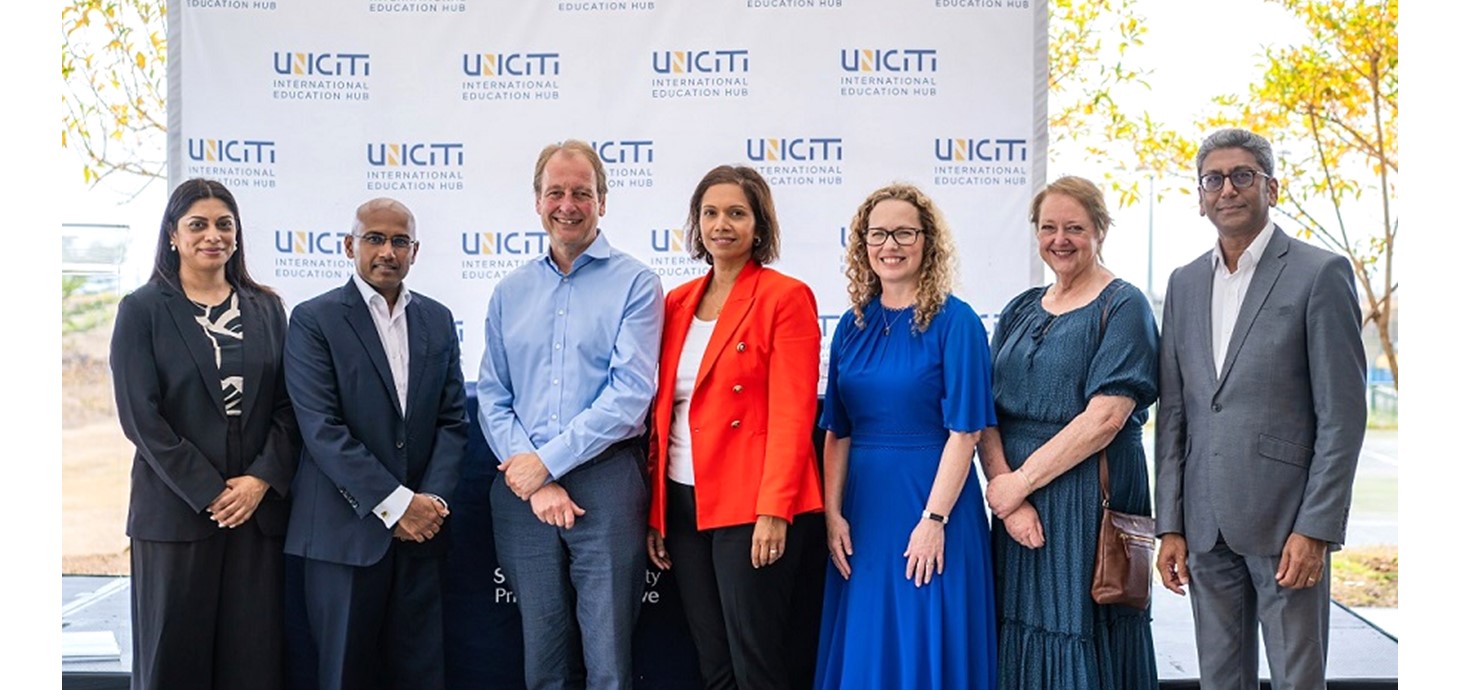
Launch of the partnership: (l-r) Deeptee K Bungaree Gooheeram, UK High Commission; Dhiren Ponnusamy, Medine; Professor Paul Boyle, Swansea University; Charlotte Pierre, UK High Commissioner; Professor Lisa Wallace, Swansea University Medical School; Professor Jayne Cutter, Swansea University School of Health and Social Care; Professor Dhanjay Jhurry, Uniciti.
A nursing degree top-up programme which has just started is the first of many benefits set to grow from a new partnership between Swansea University and Uniciti, an international education hub in Mauritius, which has just been officially launched.
The programme allows nurses in Mauritius who already have a diploma to follow a programme delivered by Swansea lecturers comprising both face-to-face and on-line learning, which will ultimately lead to an honours degree in nursing, enhancing their status and skills.
It is an example of how the new partnership will improve healthcare, as well as strengthen both Uniciti and Swansea University.
The Uniciti team approached Swansea University to be their healthcare partner due to its strong reputation in healthcare education. Nursing at Swansea is ranked in the top 10 in the UK, and the Medical School was ranked 5th in the UK by the Sunday Times.
Uniciti’s aim for healthcare is to become a regional centre for excellence for developing specialist skills, not only for the island of Mauritius but also the wider African continent and the Indian Ocean.
Two years of planning and close collaboration lie behind the new programme and the wider partnership, which includes continuing professional development (CPD) courses and a PGCert in Education for Healthcare Professionals. A recent visit by three Swansea University leaders - the Vice Chancellor, the Associate Dean International for Medicine and Life Science, and the Head of the School of Health and Social Care - marked the official launch of the partnership.
During the visit, the team visited local hospitals, giving them the chance to discuss healthcare and education needs directly with Mauritian nurse leaders.
This is in line with a key priority for Uniciti and Swansea University as they developed their programmes together, which is to ensure that the content would meet the needs of the region’s people. For example, Mauritius has one of the world’s highest rates of diabetes, so this has been taken into account when planning CPD.
The top-up programme has been approved by the Mauritian Nursing Council and Higher Education Council and other programmes are currently going through the approval process. The partnership’s ambition is to expand the programme portfolio across healthcare and medicine in the coming years.
Benefits of the partnership already in place or agreed are:
- The full-time one-year top-up programme, just started, upgrading a nursing diploma to a degree. This allows nurses already working to improve their skills without a major interruption to their career.
- Postgraduate certificate in Education for Healthcare Professionals– this part-time course will enhance the skills and status of nurses from Mauritius and the wider region who already have a degree, enabling them to deliver education for students on nursing programmes.
- Continuing Professional Development for nurses – this will involve training in specific areas, such as diabetes care, that target the needs of the regional population.
The most obvious impact of these new programmes will be to strengthen healthcare leadership and bolster the profile of nursing in Mauritius and surrounding countries. More broadly, the partnership will foster international collaboration between Mauritius and Swansea, with the potential for staff and student exchanges, as well as contribute to UN Sustainable Development goals for healthcare.
For Uniciti the partnership can help to reinforce their position as a major regional hub for training.
For Swansea University, it will generate revenue to strengthen the organisation, as well as create opportunities to learn from Mauritian and regional partners.
Dhiren Ponnusamy, chief executive officer of Medine, the parent organisation of Uniciti International Education Hub, underlined the importance of this initiative:
"We are delighted to welcome Swansea University to the Uniciti International Education Hub. This partnership reflects our ambition to position Mauritius as a hub of educational excellence in the region. By offering advanced academic programs and CPDs that meet the evolving needs of healthcare professionals, we contribute to the development of qualified talent capable of generating positive impact both locally and regionally."
Professor Paul Boyle, Vice-Chancellor of Swansea University, said:
“We’re honoured to become established in Mauritius through the Uniciti International Education Hub, who have played an enormous role in making this project a reality. This initiative enables us to use our academic expertise to serve Mauritians and the wider region, by contributing to the training of qualified healthcare professionals, through programmes that are centred around modern and innovative skills.”
Charlotte Pierre, British High Commissioner to Mauritius, attended the launch and said in a post on X:
"Delighted to launch a new partnership between @SwanseaUni and @medineducation. Swansea University is bringing an internationally recognised qualification on nursing to Mauritius, expanding opportunities for Mauritian students. This is a continuation of the UK-Mauritius Strategic Trade Partnership."
